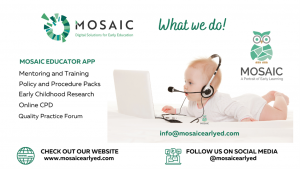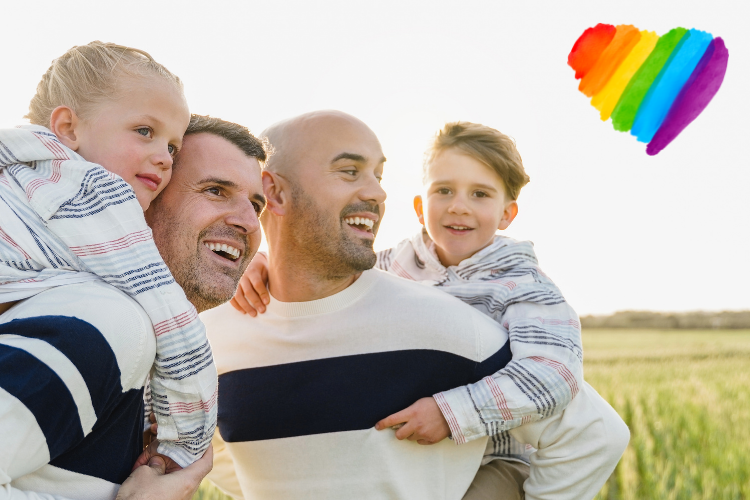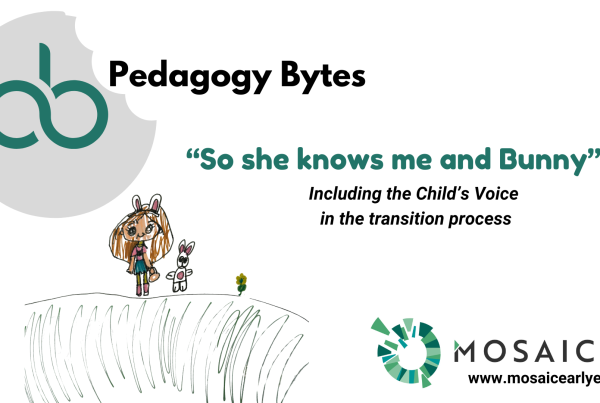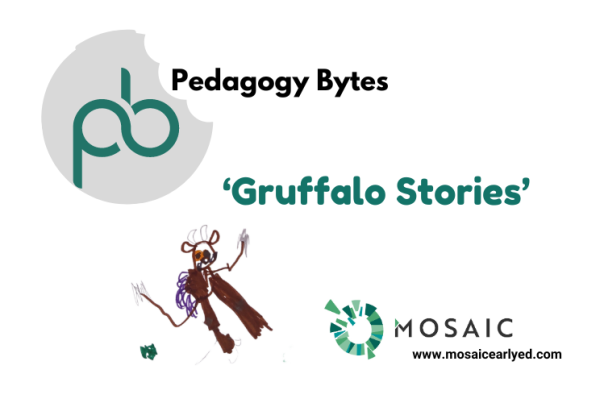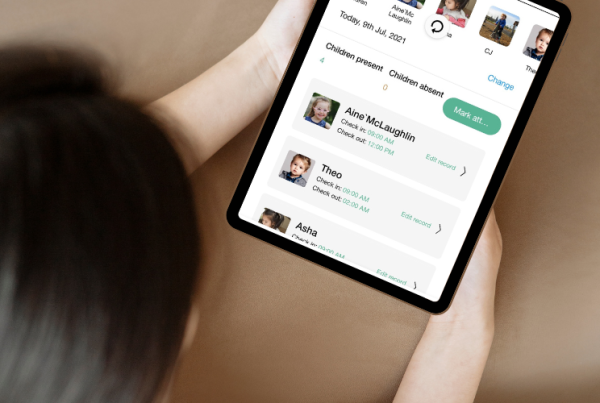‘Emotionally Safe’ early childhood settings
Well-being, Identity and Belonging are core themes of Aistear – the Irish early childhood curriculum. ‘Experiencing a feeling of belonging is crucial to every child and to family well-being. As the family represents the most fundamental component of the young child’s self-identity, the view of family in all its diverse forms, is a central to inclusive early childhood practice.
Early childhood educators hold a very influential position in their work with an increasingly diverse population of children and families. This diversity can include children from families headed by a single adult, families of divorced parents, families headed by a relative other than a parent, or families headed by parents who are *LGBTQIA+.
This blog is intended as a practical support to provide early childhood services with a family inclusive checklist to welcome all families as we celebrate Pride Month.
Children need to feel ‘emotionally safe’
We can appreciate that the early childhood setting is a ‘safe’ environment for children. But safety goes beyond physical safety – we must also nurture the child’s ‘emotional safety’. Emotionally safe environments ensure equality, respect, and dignity for parents and staff members, regardless of their sexual orientation, gender identity, marital status, or gender expression.
So, do we give enough thought when ‘celebrating’ and promoting events like Mother’s Day or Father’s Day for children whose lived experience is removed from the traditional notions of family?
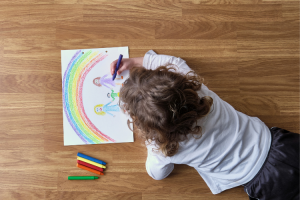
‘Welcome proofing’ your early childhood setting
Time spent reflecting is always time well spent. Take a little time to reflect on what you are currently doing well in the area of including all families and identify any additional areas that you could address. You can use this simple checklist to help you self-assess your current practice around the inclusion of families headed by parents who are *LGBTQIA+. Why not discuss at a staff meeting and get everyone involved in the conversation!
What does your environment say to children and families:
- Are there photos/posters in common areas and in rooms promoting inclusive definitions of families? For example, are there photos of single, LGBT-headed, grandparent-headed, and multi-racial families?
- Is there a place to display a “Families Gallery” that includes every family (including staff)? Are these displays at eye level for children and used for day-to-day reference and conversation?
- Do you celebrate ‘Family Day’ or ‘Person you Love Day’ instead of Mother’s Day or Father’s Day?
Could activities be more open and inclusive?
See how many items on this checklist can you say yes to
Role/Real life play:
- Do figures of families and people represent different cultures and families?
- Are there multiple sets of “family” figure dolls so that children can select or create a grouping that most looks like their own family?
- Are figures stored in arrangements that allow children to make selections that represent their family structures, rather than in arrangements that may only represent one kind of family (e.g., having a mother, father, child, and baby)?
- Are children encouraged to use all of the different props and dress-up materials?
Circle or group times:
- Do you invite discussion about different kinds of families and the things that families have in common? Focus on love, relationships, and caregiving. For example, “Let’s talk about who takes care of us at home.”
- Do you address name-calling and hurtful behaviours and teach positive social interactions?
- Do you communicate with children about things they have in common, and differences?
- Are children’s stories shared with other children in ways that encourage respectful exploration of each other’s experiences and ideas?
Creativity:
- Are a wide variety of gender free ‘loose parts’ resources available?
- Are there materials and opportunities for children to express their ideas about themselves, their families, and their experiences?
- Are children encouraged to share their work and ideas with family in ways that invite conversation and exploration?
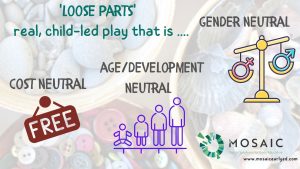
Songs, Rhymes and Books:
- Do you change lyrics of common children’s songs to be more inclusive?
- Do children’s books/puzzles/games represent different kinds of families?
- Do books that are used for discussions with children allow them to share their own experiences, ask questions, and explore the many ways of being?
- Are children engaged in making their own books, especially “My Family” books? Are these displayed with the other books in the library and sturdy enough to be handled regularly by children?
*See the booklist at the bottom of this article for some new books for your library.
Conversations:
- Do you give children ‘voice, space and audience’ to share their own stories?
- Do you address children’s comments and questions about different family structures with age-appropriate answers that focus on the love that brings families together?
- Are you ready to answer questions from children about LGBT-headed families? They may have questions such as, “Why does my friend have two mums?” You could say, “She has two mums who love each other and who love and take care of her, just like your grandma takes care of you.”
- They might ask, “Where is Jason’s mum?” You could say, “Jason has two dads instead of a mum and a dad. That’s who is in his family. A family can be made up of many different people.” Keep answers simple and age appropriate.
Consider how you communicate with parents and families:
- Look at the language on your application forms and general announcements. Do they use language such as ‘Dear Family’ than mother/father?
- Specific family chosen titles are important to the child. Ask families what children call them? For example, if a child has two dads, are they called “Daddy” and Papa.” Or if a grandmother is raising a child, is she “Granny” or “Nana”?
In summary, children’s identities and sense of self are inextricably tied to their families. The experience of being welcome or unwelcome, visible or invisible, having a voice or not, begins in early childhood. Educators have a responsibility to gatekeep children’s emotional safety by offering a curriculum void of bias and outdated notions. How wonderful it is to be part of a profession that can make things better for children by taking responsibility for progressive change.
*LGBTQIA – Lesbian, Gay, Bisexual, Transgender, Intersex, Queer and/or Questioning, and Asexual and/or Ally.
BOOKLIST
Some great books to have in your library – all available on Amazon Books or ask your local book store to order in:
It’s OK to be Different: A Children’s Picture Book About Diversity and Kindness by Sharon Purtill and Sujata Saha | 19 Sep 2019
The Flamingo Who Didn’t Want To Be Pink
by Nicola Stone | 15 Jun 2019
by Gemma Denham | 2 Mar 2018
by Gemma Denham | 18 Aug 2017
A Day of Pride: A children’s book that Celebrates Diversity, Equality and Tolerance!
by Roy Youldous-Raiss , Yossi Madar, et al. | 26 Oct 2020
And Tango Makes Three (Classic Board Books)
by Justin Richardson , Peter Parnell , et al. | 2 Jun 2015
The Every Body Book: The LGBTQ+ Inclusive Guide for Kids about Sex, Gender, Bodies, and Families
by Rachel E. Simon and Noah Grigni | 18 Jun 2020
Acceptance is my Superpower: A children’s Book about Diversity and Equality (My Superpower Books)
by Alicia Ortego | 10 Apr 2021
by Sarah Brannen and Lucia Soto | 13 May 2021
The Hips on the Drag Queen Go Swish, Swish, Swish
by Lil Miss Hot Mess and Olga De Dios Ruiz | 28 May 2020
The Great Big Book of Families
by Mary Hoffman and Ros Asquith | 5 Mar 2015
by Leslea Newman and Carol Thompson | 15 Jun 2009
by Robb Pearlman and Eda Kaban | 10 Jun 2021
by Suzanne Lang | 1 Oct 2019
-Ends-
About the Author:
Avril McMonagle is Founder and CEO of MOSAIC Digital Solutions for Early Education which provides a range of child centred digital products, training and quality compliance supports for early childhood services and stakeholders. The company flagship products are the MOSAIC Educator and MOSAIC Family Apps which offer multi-modal documentation and assessment tools for professional educators. For more or to book a demo see www.mosaicearlyed.com; email [email protected] and follow us on social media @mosaicearlyed
